After our recent several-month trip wandering across Europe by various trains, a ship, and a sailboat, we returned to Albuquerque to visit friends and family. But the north winds of November soon began to caress the Duke City, a good time to point our car toward the south. It's about 14 hours of driving time to reach Kino Bay, and we break it up with an overnight stop in southern Arizona. Something changes when we cross the border onto the Nogales bypass around 10 am the following morning; we feel the simple, less-manicured (read: rougher) pavement beneath our tires, and say "Buenos días" to the lady at the first toll booth.
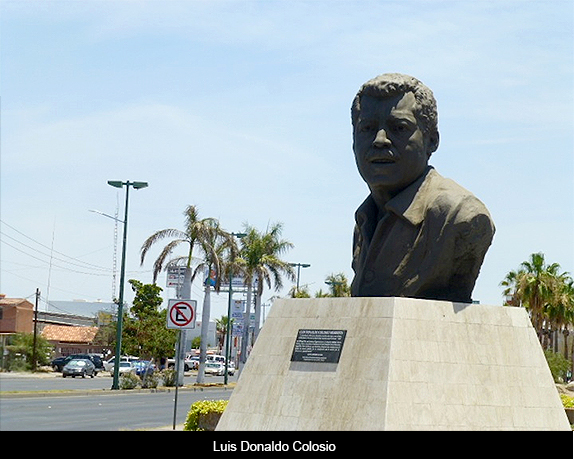
We might stop at the old plaza in Magdalena de Kino for another look at the huesos (bones) of Padre Kino, lying under plexiglas in the kiosk. And we might yield to a delicious chocolate and fruit-infused raspado at one of the little shops nearby. Those ladies do such great raspados. A modest bust of Luis Donaldo Colosio Murrieta stands on the east side of the plaza, with quotations from this Magdalena native, an inspiration to an entire country before he was assassinated in Tijuana in 2003. There's a far larger bust of Colosio in Hermosillo, near the Costco.
Something about being back in Mexico makes us slow the pace and enjoy the pageant as it presents itself – sometimes in surprising ways. One day while exploring the back roads of Magdalena de Kino, I got a wonderful picture of a mariachi band heading to work at a restaurant. Dumb luck can be the best kind.
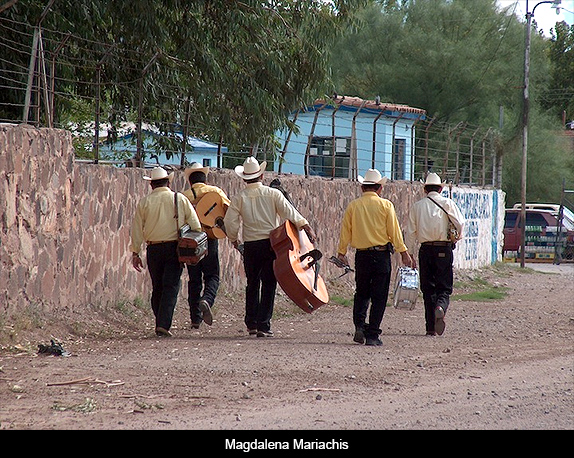
While we sometimes like to pretend otherwise, facts are what govern our lives. The hard facts of life provide the food we eat, the air we breathe. Yet the lies we tell ourselves, the popular myths we embrace, are how we flourish. Photos are lies, maybe wonderful lies that support our myths – at least the photos I send with my letters where I try to show the richness of life in this modest corner of Mexico. Please indulge me, and I'll try not to mislead you too badly.
About an hour and a half further down the road, we'll stop for a few items in Hermosillo as we make our way through the busy streets; we're used to the traffic by now, and it's no longer intimidating. (Our mantra: flow like water.) And that evening we'll be back in little Kino Bay, where we know most of the people we pass on the street, and life will take a rest as we crest that last hill overlooking the rich and sparkling Sea of Cortez.
Whenever we're away, Pablo and Lulu move into our house. They take good care of us, and we look after them. In Mexico you don't hire people so much as adopt them, and they adopt you. It puts us in the odd position of being "patrones," and that implies more than just being The Boss. We have our responsibilities.
In the morning we'll awake to yet another glorious dawn, and maybe a cool dry breeze will drift down from the north to sweep over the warm waters of the estuary and drape a foggy mantle over the shoulder of little Isla Pelícano. We'll see gull tracks and crab tracks, or perhaps a pelican skull, as we walk along the water's edge. And we'll recall the massive whale bones that appear at times on the shore. Whales die now and then, and they float ashore to scrawl a graceful figure upon a beach like a massive dinosaur unearthed by waves.

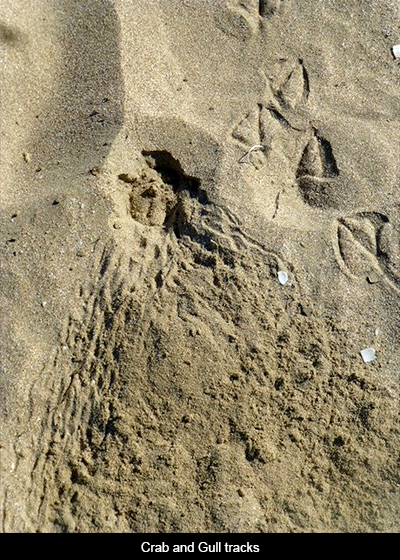
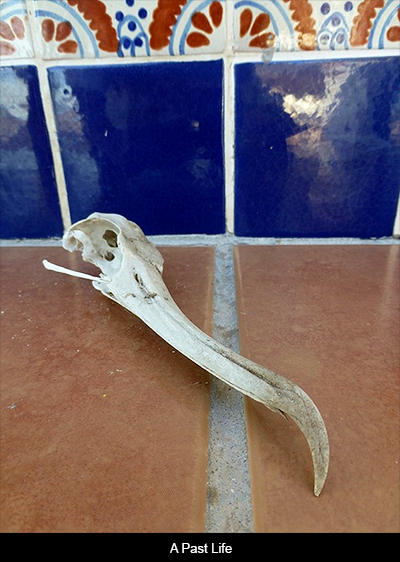

Friends who once had a very nice place in San Miguel de Allende tell us of the cultural activities there. But they could never break into the local society, and forever felt excluded. That's not the case in Kino Bay, where they currently live, and where there's much to involve them. There's a group here that provides scholarships so local kids can stay in "prepa," the high school, which is not free. Others provide spay and neuter services to the local beach dogs, or give medicines to poor families in need, or help with housing for the indigent, of whom there are many. There's much to do here; it's very satisfying, while it provides an entree into the local culture. We find ourselves working side-by-side with people we'd never encounter in the oddly cloistered world of a large city — people with political views far divergent from our own, but who also see a local need and get involved. We put the differences behind us to get the job done. It can be a revelation.
We'll have drinks on Saturday night at the palapa bar over the Casablanca Inn with our friends Ernesto and Alma. He's a talented engineer who's designed some of the better-looking overpasses in Hermosillo. She's a school administrator. It's always a pleasure to see them. They speak no English. Juan, another engineer and college professor in Hermosillo, and his artist wife, Elsa, are also good friends. One of Elsa's fine large paintings (of colorful ollas de barro) hangs in our living room. Our neighbors, Mario and Alma, take their family to Canada for vacation so their kids will learn to speak English correctly – and probably to avoid the indignities of crossing the US border. We surely can't blame them. We rarely feel compelled to travel to "el otro lado (the other side)" ourselves.
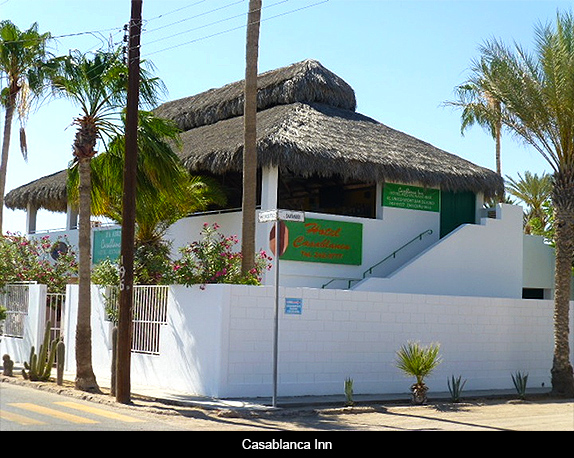
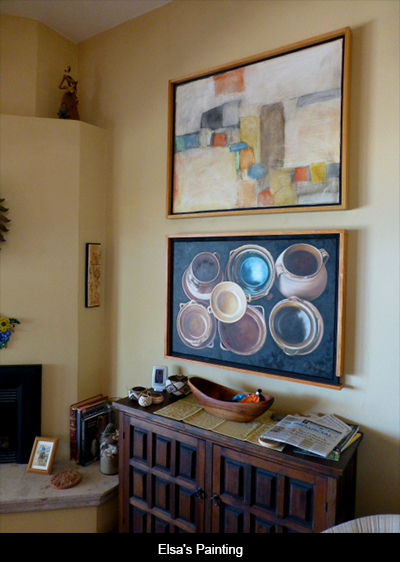
From our house, I walk five blocks to Gustavo's store for a few items and a copy of the local newspaper – he calls it "las mentiras de hoy," ("today's lies"). Gabriel García Márquez (called "Gabo" down here) has passed away recently, and the paper has many pages of print devoted to him. This is a nation where reading is still valued highly.
I reach into my pocket to pay Gustavo and there's a 200 peso bill with a picture of Sor Juana Inéz de la Cruz, a 17th century nun, poet, and feminist icon. I'm reminded of the production, The Sins of Sor Juana, we saw a few years ago at the Goodman Theater in Chicago. Her 'sins' were that she wrote fine poetry and thought for herself in the 1600s. Google her sometime. The hundred-peso note has a fierce picture of Nezahuacoyotl ("Neza," for short.), the Aztec poet-king who preceded Moctezuma.
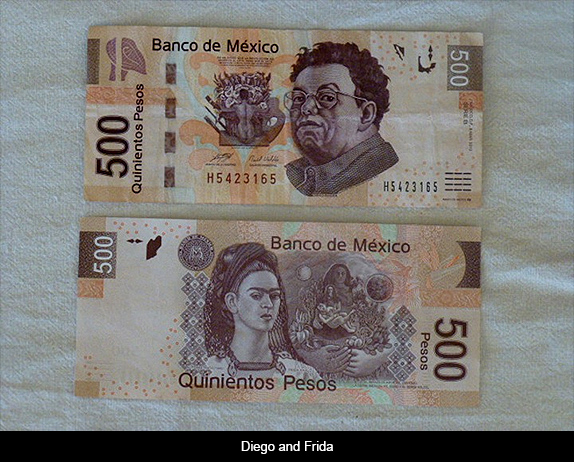
And the 500 peso bill features Diego Rivera on the face, with Frida Kahlo on the reverse. Actually, they're each represented on each side of the bill in each other's turbulent artworks, as befits their marvelously messy and fraught life together. (Frida appears in Rivera's "Desnudo con Alcatraces." And she's cradling Diego, as a baby, in her painting, "El Abrazo de Amor del Universo, La Tierra” (México, Yo, Diego, y el Señor Xólotl.)
A 20 peso coin minted in 2010 had an engraving of Octavio Paz to commemorate the 20th anniversary of his 1990 Nobel Prize in Literature. How many US bills and coins feature artists, poets, and writers?
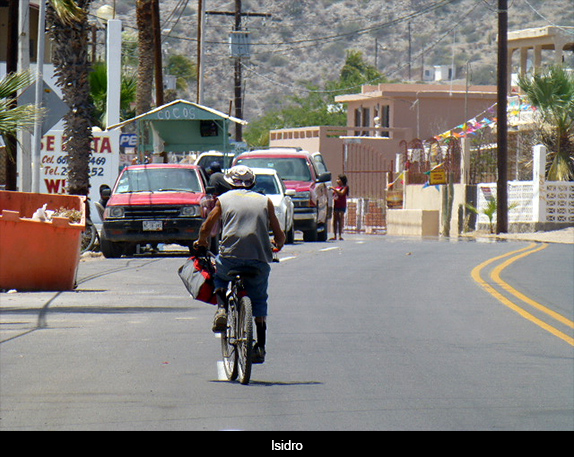
On my return home, I pass Isidro riding his bicycle. He's a scrawny guy who climbs palm trees to trim the fronds. He usually owes me work for which I have paid him "en adelante" because he needs to buy food or something. I call it a 'retainer,' just like lawyers also get for not doing anything. It helps to have a very good sense of humor when living in Mexico; without it you might not do well. A few years ago, Isidro fell out of a tree and broke his leg in several places. For the longest time he had one of those stainless rods running down the outside of his leg, bolted to various new parts on the inside. He told me that was the last time he would ever trim tall palm trees while stoned. Good plan, Isidro.
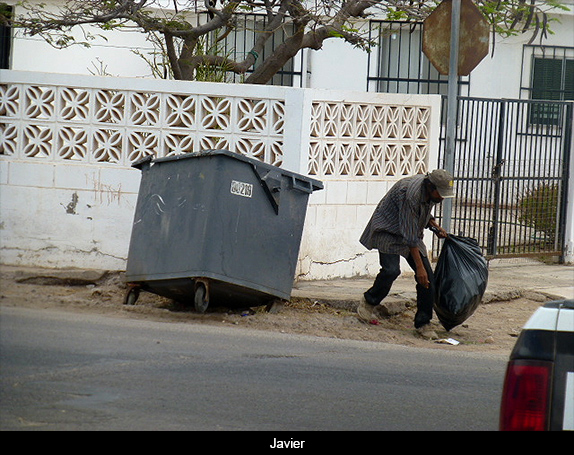
I see Javier collecting soda and beer cans. Most Gringos just call him "the can man." He's probably the scruffiest, most disreputable-looking character in town, but he walks the long street along the beach (about 7 miles each way) every day in search of aluminum cans, carrying large bags of "botes" over his skinny shoulder. He might smell bad and look awful, but he's the hardest-working "botero" in town. He doesn't ask for much, but sometimes needs 50 pesos for medicines. He jabbers along semi-intelligibly, in his Sonoran-inflected Spanish, about his health problems and I reach into my pocket for another 'retainer.'
I long ago stopped worrying about the 'morality' of being an easy touch because we're so much better off than many of the people here; the morality of it all seems like an affectation. While I don't tend toward handouts to young healthy people, for hard-luck old-timers, there is no way I'm going to change their lives. When a grizzled old guy asks for a handout I'll ask why he needs the money (if i'm going to be the patsy, I'm entitled to engage with him a bit). Usually, there's a liquor bouquet on the breath, and I'm just thankful I somehow avoided that fate. "Food" is always the answer. After a round of tongue-in-cheek questions and bemused answers, I'll lead him into the nearest store and buy him something to eat. He's usually confused, as if he's never actually had to deal with food before. Then I wish him luck and go on my way. The other day I dragged an old unfortunate into Chata's tienda. He'd asked for "…unos pesitos, por favor." Chata sat behind the counter with a broad incredulous smile as she watched all this unfold. Her large eyeballs rolled from me to the old guy and back to the tall peculiar gringo with the salt-and-pepper (mostly salt, these days) beard, as we bantered back and forth and I bought the old guy something to eat.
I walk past a beat-up old car that someone is trying to sell. The passenger-side door is standing open and a guy is sitting inside with the radio thumping out norteño music, the oompah, the crashing drums, and the exuberantly sour trumpet notes fill the air with passion. Normally, people here just draw a big "$" sign and a phone number on the windshield when they want to sell a car. This rusty old thing has a "¢" sign on it. Love the humor here.
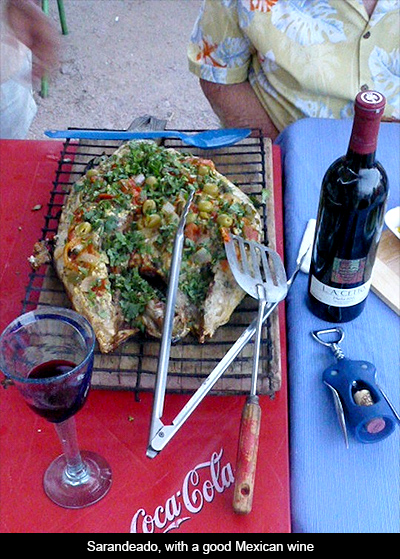
Before finally getting home, I stop to discuss arrangements with our old friend "Zana" for a "pescado sarandeado" we're planning to enjoy with some friends. That's a large fish covered in diced vegetables, slow-cooked over a wood fire, and accompanied with a special rice dish and slaw made by Judy, his partner of several decades. We'll all sit around a large table in the open air at Zana's street-side shack, and we'll share that fish. Friends will cruise slowly by, and we'll share the news of the day. We'll bring our own beer or wine to grace the table. Zana is a fine cook and he's had a rich and varied life. After dinner, the sun will set, and someone will pull a golden bottle from under the table. The tequila will flow and Zana will tell us again of his days growing up in the Yucatán, his years of working as an illegal in the US, and how he got to Kino. And later, as the night grows long, he'll talk of his days as a diver with Jacques Cousteau, exploring the miraculous Sea of Cortez.
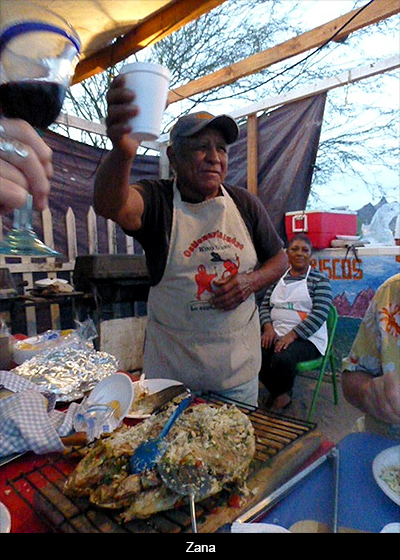

June 04, 2014